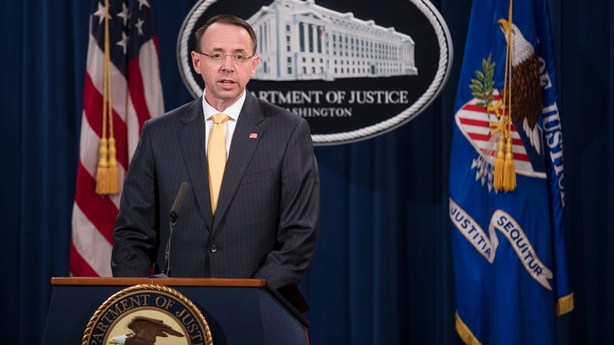US Special Counsel Robert Mueller has announced the indictments of 13 Russian nationals and three companies for alleged interference with the 2016 presidential election.
According to the unsealed indictment the accused conspired - from 2014 until today - to interfere "with the US political and electoral processes, including the presidential election of 2016."
The Russian foreign ministry dismissed the indictments as "absurd".
The 37-page indictment describes a conspiracy to disrupt the US election by people who adopted false online personas to push divisive messages; traveled to the United States to collect intelligence; and staged political rallies while posing as Americans.
Russia's Internet Research Agency "had a strategic goal to sow discord in the US political system, including the 2016 US presidential election," the indictment said.
The indictment broadly echoes the conclusions of a January 2017 US intelligence community assessment, which found that Russia had meddled in the election, and that its goals eventually included aiding then Republican nominee Donald Trump, over election rival Democratic Party candidate Hillary Clinton in November 2016.
"This indictment serves as a reminder that people are not always who they appear to be on the Internet," Rod Rosenstein, the Deputy Attorney General, told reporters.
"The indictment alleges that the Russian conspirators want to promote discord in the United States and undermine public confidence in democracy. We must not allow them to succeed."

Following the indictment, Mr Trump acknowledged that Russia launched an anti-US campaign ahead of the 2016 presidential election.
However in a post on Twitter, he said that his campaign did nothing wrong.
Russia started their anti-US campaign in 2014, long before I announced that I would run for President. The results of the election were not impacted. The Trump campaign did nothing wrong - no collusion!
— Donald J. Trump (@realDonaldTrump) February 16, 2018
In a post on Facebook, a spokeswoman for the Russian foreign ministry wrote: "Thirteen people carried out interference in the US elections? Thirteen against the billion-dollar budgets of the special forces? Against the espionage and counter-espionage, against the newest developments and technologies?
"Absurd? Yes. But this is the modern American political reality," she added, in the first official reaction from Moscow.
Under the management of Yevgeny Prigozhin, a close ally of Russian President Vladimir Putin, the group reached "significant numbers" of Americans, according to the indictment.
They had a "strategic goal to sow discord in the US political system" and by mid-2016 were supporting Mr Trump's campaign and Ms Clinton.
The group was based in Mr Putin's home town of Saint Petersburg, but some of the accused traveled to the United States.
Stops included Nevada, California, New Mexico, Colorado, Illinois, Michigan, Louisiana, Texas, Georgia and New York.
An unnamed Texas-based American political operative is said to have instructed them to focus on so-called "purple states" which swing between Republican and Democratic control.
"Hundreds" of people were said to have been involved in the operation, working in shifts and with a budget of millions of dollars.
They allegedly targeted social media sites like Facebook, Twitter, YouTube and Instagram.
Two of the firms are said to have Russian government contracts.
A Russian lawmaker called the US charges "another anti-Russian push," RIA reported.
White House spokeswoman Sarah Huckabee Sanders said that Mr Trump has been briefed on the indictment.
Facebook and Twitter both declined to comment on the indictment.

